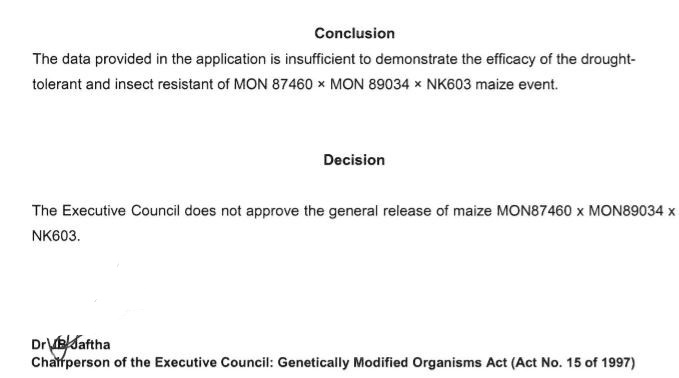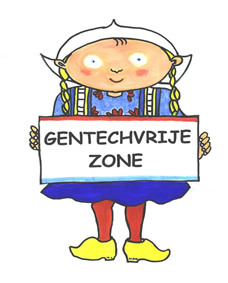Open Consultations
Het blijkt dat er verkeerde data (EFSA-opinie) worden vermeld, we hebben een email gestuurd. Zo lang kun je nog niet echt goed reageren. Daarom gingen we zelf zoeken. De goede EFSA-opinie is hier te vinden.
Naar de consultatie site van de EU. Het is de eerste mededeling van boven.
De opmerkingen van de lidstaten vindt u hier (AP134 MS comments.pdf, 4de van onder) Alsmede alle andere documenten.
Laatste nieuws: deadline opgeschoven naar 26 september a.s. na protest.
Meer erover lees je hier.
Het gaat hier ook om een vrij nieuwe gentech maisvariatie die tegen droogte zou kunnen: Drought-Tolerant Maize MON 87460 een heel andere mais dus, waar ook een antibioticumresistentie aan te pas komt, het neomycin phosphotransferase II protein (NPTII). Deze antibioticumresistentie is omstreden omdat ziekteverwekkers steeds meer resistent worden tegen antibiotica.
Drought-Tolerant Maize MON 87460 een heel andere gentech mais dus. Deze gentech mais is slechts een keer eerder toegelaten tot de EU markt in 2015 (meer over MON 87460 ). Ook via Nederland. Maar niet gestapeld, maar alleen d.w.z. niet in combinatie met andere gentech mais. Hier kunt u alle in de EU toegelaten gentech gewassen vinden. MON87460 komt van een Monsanto/Gates Foundation project, in Zuid-Afrika het WEMA project genoemd.
South Africa government rejects Monsanto’s triple stacked GM drought-tolerant maize

Vertaling in het kort: De Zuid-Afrikaanse regering weigert Monsanto´s drie gestapelde gentech tegen droogte bestand gemaakte mais commercieel te laten verbouwen. De ACB en meer dan 25.000 mensen tekenden hiertegen een petitie. De aanvraag werd niet gesteund door peer reviewed wetenschappelijke data en het bewijs dat ondersteunt dat MON87460 droogte tolerant zal zijn en resistent zal zijn tegen insecten. Het gaat om MON87460 x MON89034 x NK603. En de toelating waar we nu bezwaar tegen kunnen maken is Maize MON 87427 × MON 87460 × MON 89034 × MIR162 × NK603. Zelfs vijf gestapelde gentech mais en alle combinaties daarmee!
GMWatch: Details: Published: 15 November 2018. Created: 15 November 2018. Last Updated: 20 November 2018.
“The ACB and more than 25,000 people from South Africa, the rest of the continent and around the world signed a petition rejecting Monsanto’s application on the grounds that:
* The application was not backed by peer-reviewed scientific data and evidence supporting Monsanto’s claim that MON87460 will confer drought tolerance”…More
Meer over deze aanvraag:
The five-event stack maize was produced by conventional crossing to combine five single maize events: MON 87427 (expressing the 5-enolpyruvylshikimate-3-phosphate synthase (CP4 EPSPS) protein); MON 87460 (expressing the cold shock protein B (CSPB) and neomycin phosphotransferase II protein (NPTII)); MON 89034 (expressing the Cry1A.105 and Cry2Ab2 proteins); MIR162 (expressing
the Vip3Aa20 and phosphomannose isomerase (PMI) proteins)); and NK603 (expressing the CP4 EPSPS protein and the variant CP4 EPSPS L214P) to confer resistance to certain lepidopteran pests and tolerance to drought and glyphosate-containing herbicides. EFSA opinion.
Fragment bezwaar van de Gentechvrije Burgers:
Quote EFSA: ”Daar hebben we niet de opdracht toe gekregen”
Het wordt tijd dat de volledige aandacht wordt gegeven aan de giftigheid van de herbiciden waar deze gentech mais en andere gentech gewassen tegen bestand zijn gemaakt en aandacht te besteden aan de ingebouwde insecticiden die deze gentech gewassen ingebouwd hebben gekregen alsmede aandacht te besteden aan de ingebouwde antibioticaresistentie. Schrijven dat u daar niet de opdracht toe hebt, is een gotspe. (“ The assessment of herbicide residues and metabolites is not in the remit of the GMO Panel.” Reactie op een commentaar van Oostenrijk, blz. 73, Application EFSA-GMO-NL-2016-134). Wiens taak is dat wel? En waarom lezen we daar niets over?
Gentechgewassen bestand tegen giftige herbiciden en ingebouwde insecticiden
Want dit feit zorgt het juist voor dat deze gentech- en andere gentechgewassen zo giftig zijn ook voor het nageslacht! Afgezien van het feit dat er ook is geknutseld met het DNA, de blauwdruk van het leven, waarvan je vooraf nooit kunt voorspellen wat het uiteindelijke resultaat zal zijn, worden zij verder dus zo giftig gemaakt, dat deze gentechgewassen nooit op de EU markt zullen mogen komen! Ook niet omdat er een mais bij zit die tegen droogte bestand is gemaakt en een antibiotica resistentie bezit. De vraag is wat doen die combinaties samen, dat is niet onderzocht!
Het is wel bijzonder dat Nederland toch kritiek heeft, terwijl de intentie is, dat deze mais via Nederland toch op de markt zal komen. Kunt u ons dit uitleggen??
Nederland: “MON87427xMON87460xMON89034xMIR162xNK603 expresses the antibiotic resistance gene nptII which confers resistance to kanamycin and neomycin. The presence of antibiotic resistance genes in GM plants is controversial. By some antibiotic resistance genes in GM plants are perceived as a risk due to potential transfer of antibiotic resistance genes to bacteria. So-called horizontal gene transfer between plants and bacteria has not been observed in field experiments. The nptII gene is present in bacteria in the environment, and the above-mentioned antibiotics are of minor importance to human medicine. Therefore, the presence of nptII in GM plants poses a negligible risk to the environment. In view of public perception, the presence of the nptII antibiotic resistance gene in MON87427xMON87460xMON89034xMIR162xNK603 may, however, be considered undesirable.”
“The applicant claims that the information in the application is confidential. The Aarhus Convention regularises the right of the public to access environmental information and has been implemented in the European legislation. According to Article 30 of Regulation (EC) No 1829/2003 information on amongst others the composition of a GMO, physico-chemical and biological characteristics, and effects on human and animal health and the environment cannot be declared confidential. The EFSA has informed the European Commission on the claim for confidentiality of the application and awaits its decision. Information which is crucial to assess potential risks of a GM crop should not be declared confidential, because a lack of transparency undermines public trust in the risk assessment.”
Maar ook:
“The Dutch CA has assessed the dossier with respect to the food and feed safety of MON87427 x MON87460 x MON89034 x MIR162 x NK603 maize and has no comments or requests for additional information in relation to the safety of this GM event.”
| Maize MON 87427 × MON 87460 × MON 89034 × MIR162 × NK603 Scientific Opinion on the assessment of genetically modified maize MON 87427 × MON 87460 × MON 89034 × MIR162 × NK603 and subcombinations for food and feed uses submitted under Regulation (EC) No 1829/2003 by Monsanto (EFSA- GMO-NL-2016-134) EFSA opinion: 8 August 2019 Deadline: 8 September 2019 Make comments |

